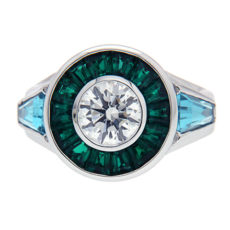Couples set to tie the knot spend a lot of time and money on selecting
the perfect engagement or wedding ring for their special day that has the most
exquisite shape. The teardrop or pear-cut shape has been exemplary for a long
time, and there seems to be no decline in its popularity. The shape symbolizes
raindrops and tears of joy, and therefore many people choose to wear this on
their big day. But finding a perfectly cut pear-shaped diamond is not that easy
and takes quite an amount of effort.
Reasons Behind the Demand for Pear
Cut Diamonds
There are many reasons for people choosing pear-cut diamonds over
round-cut diamonds. Owing to this elongated shape, the rock appears to be much
bigger than a round-cut diamond. But wait! It’s not just about the shape. The
top surface of a pear-cut diamond is 8% bigger than the round-cut diamond. You
may be wearing a small diamond. However, it will still come across as a bigger
one, thanks to its shape. Now comes the most significant part. Pear-shaped
diamonds can be 10% to 30% less costly than a round cut but still have the same
carat weight. Overall, it makes for a modern yet very classy look. There is no
right way to wear the diamond. The pointed end of the diamond worn toward the
fingernail is possibly the best way to wear it. But some prefer wearing it the
other way around.
However, pear-cut diamonds come with their own set of drawbacks. The tip
of the stone is delicate and may get chipped on impact. But if the immaculately
set diamonds can avert damages to a great extent.
Even the task of finding well-cut pear cut diamonds becomes complicated
by the fact that gemological laboratories do not give any cut quality grades
for such fancy-shaped diamonds.
How to Find the Perfect Pear-Cut Diamond?
You require an eye to find a well-cut and sparkling stone. Determining
whether the diamond is up to the mark or not can be difficult when it comes to
pear-shaped diamonds. Shape and performance are both crucial in the case of
these diamonds. Perhaps, you should know what you want exactly. One can start
by limiting the table to 55-66% and the depth to 56-66%. These apart, a grading
report cannot shed any other light on the quality of the cut. One should also
check the symmetry in the pear-cut diamond’s shape. Imagine drawing a line from
the diamond’s tip to the middle. Ideally, both sides of the stone should be
symmetrical.
The L/W ratio of length to width ratio is the predilection of the
individual wearing the diamonds. In most cases, the ratio is 1.45 to 1.75.
People settling for smaller diamonds can choose ratios of 1.60 to 1.75. The
longer the diamonds, the bigger they will appear on your finger. The use of
prongs makes the stones appear triangular at times.

Comments
Post a Comment